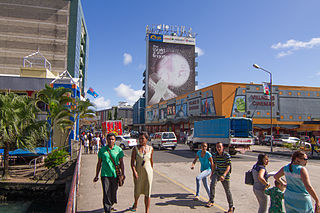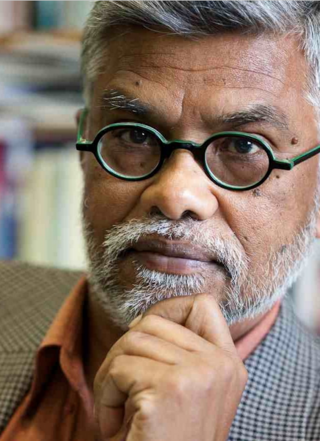
Fiji, officially the Republic of Fiji, is an island country in Melanesia, part of Oceania in the South Pacific Ocean. It lies about 1,100 nautical miles north-northeast of New Zealand. Fiji consists of an archipelago of more than 330 islands—of which about 110 are permanently inhabited—and more than 500 islets, amounting to a total land area of about 18,300 square kilometres (7,100 sq mi). The most outlying island group is Ono-i-Lau. About 87% of the total population live on the two major islands, Viti Levu and Vanua Levu. About three-quarters of Fijians live on Viti Levu's coasts, either in the capital city of Suva, or in smaller urban centres such as Nadi or Lautoka. The interior of Viti Levu is sparsely inhabited because of its terrain.

Kiribati, officially the Republic of Kiribati, is an island country in the Micronesia subregion of Oceania in the central Pacific Ocean. Its permanent population is over 119,000 as of the 2020 census, and more than half live on Tarawa atoll. The state comprises 32 atolls and one remote raised coral island, Banaba. Its total land area is 811 km2 (313 sq mi) dispersed over 3,441,810 km2 (1,328,890 sq mi) of ocean.

Tuvalu is an island country in the Polynesian subregion of Oceania in the Pacific Ocean, about midway between Hawaii and Australia. It lies east-northeast of the Santa Cruz Islands, northeast of Vanuatu, southeast of Nauru, south of Kiribati, west of Tokelau, northwest of Samoa and Wallis and Futuna, and north of Fiji.

Suva is the capital and the most populous city of Fiji. It is the home of the country's largest metropolitan area and serves as its major port. The city is located on the southeast coast of the island of Viti Levu, in Rewa Province, Central Division.

The Gilbert Islands are a chain of sixteen atolls and coral islands in the Pacific Ocean, about halfway between Papua New Guinea and Hawaii. They constitute the main part of the country of Kiribati.

RatuSeru Epenisa Cakobau was a Fijian chief, monarch, and warlord (Vunivalu) who united part of Fiji's warring tribes under his leadership, establishing a united Fijian kingdom. He was born on Natauloa, Nairai Island in Lomaiviti but spent his youth on Vanuaso, Gau, Lomaiviti, later returning to Bau to re-establish his Father's Ratu Tanoa Visawaqa reign. Ratu Epenisa Seru Visawaqa was given the name "Cakobau" meaning destroyer of Bau, in reference to his grandfathers' (Nailatikau) effort to first claim the tile from the people of Butoni and Lovoni, returned with most of his warriors from Vanuaso, Gau, Lomaiviti to coup the leadership in Bau then and later takeover his father's title; known after his father as the 6th "Vunivalu" or Warlord of Bau.

The University of the South Pacific (USP) is a public research university with locations spread throughout a dozen countries in Oceania. Established in 1968, the university is organised as an intergovernmental organisation and is owned by the governments of 12 Pacific island countries: the Cook Islands, Fiji, Kiribati, Marshall Islands, Nauru, Niue, Samoa, Solomon Islands, Tokelau, Tonga, Tuvalu and Vanuatu.

Brij Vilash Lal, OF was an Indo-Fijian historian who wrote about the Pacific region and the Indian indenture system. A harsh critic of the Bainimarama government, which originated in the military coup of 2006 and retained power in the 2014 elections, he lived in exile in Australia.

Beqa is an island in Fiji, an outlier to the main island of Viti Levu, 10 kilometres to the south. The island has a land area of 36.3 square kilometres and reaches a maximum elevation of 440 metres. Beqa has 9 villages divided between 2 tikinas (districts): Sawau and Raviravi. To the west is the island of Yanuca.

The British Western Pacific Territories (BWPT) was a colonial entity created in 1877 for the administration of a series of Pacific islands in Oceania under a single representative of the British Crown, styled the High Commissioner for the Western Pacific. Except for Fiji and the Solomon Islands, most of these colonial possessions were relatively minor.

Anti-Hindu sentiment, sometimes also referred to as Hinduphobia, is a negative perception, sentiment or actions against the practitioners or religion of Hinduism. It exists in many contexts in many countries, often due to historical conflict. There is also scholarly debate on what constitutes Hinduphobia in the Western World.

Hinduism in Fiji is the second-largest religion, and primarily has a following among Indo-Fijians, the descendants of indentured workers brought to Fiji by the British as cheap labour for colonial sugarcane plantations. Hindus started arriving in Fiji starting in 1879 and continuing through 1920, when Britain abolished the slavery-like indenture system. Fiji identifies people as "Indo-Fijians" if they can trace their ancestry to the Indian subcontinent, Hindus form about 27.9% the population of Fiji.

Islam in Fiji is the third largest religion. There are about 60,000 Muslims in Fiji. Muslims in Fiji are mostly Sunni Muslim with a Shia and Ahmadiyya minority. In the 1966 Fiji elections, a Suva-based Muslim communal party, the Muslim Political Front, took part. Presently, Urdu and an Urduized/Arabized/Persianized form of Fiji Hindi is widely taught among Muslim schools for the Fijian Muslims all across Fiji.
RokoMalani was high chief of the Fijian island of Lakeba. He held the title Tui Nayau and was a popular chief. He increased the influence the island of Lakeba had in Fiji.

The following outline is provided as an overview of and topical guide to Tuvalu:
Ronald Gordon Crocombe was a Professor of Pacific Studies at the University of the South Pacific. His reputation was such that he was described as the "father of Pacific Studies".

Netball in Fiji is a popular sport, with a men's and a women's national team. Netball games are most often played by girls on Saturdays during the winter, though games can be played at all times of the year. Women's participation in netball is comparable to men's participation in rugby.

Netball in Oceania is generally regarded as a woman's sport. Women's sports in Oceania have traditionally had a very low profile. Despite this, netball is popular in Oceania, with its growth partly because of New Zealand encouraging the game and providing money for the training of coaches, umpires and other netball development needs. In New Zealand and in neighbouring Australia, netball is one of the most popular sports played by women.

This timeline of the history of Tuvalu chronologically lists important events occurring within the present political boundaries of the Pacific island state of Tuvalu. This time line is introduced by the theories as to the origins of the Polynesian people and the migration across the Pacific Ocean to create Polynesia, which includes the islands of Tuvalu.
Malama Meleisea is a Samoan historian and the author of several historical books on Samoa. He holds the Samoan title Leasiolagi.














